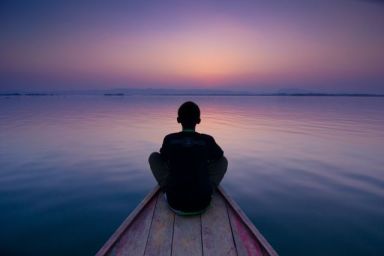Silence was the dominant experience during my month-long practice of the Spiritual Exercises. Six to eight hours of silence a day for thirty days. Why?
Silence, it turns out, is good for us. Even secular sources cite the value of silence:
- Nobel-prize winning bacteriologist Robert Koch predicted, “The day will come when we have to fight noise as inexorably as cholera or the plague.” Noise can be like an aggressive disease that wears us out and wears us down. I remember talking once with a friend who lived in a city in the Philippines. She lamented, “There’s no quiet, anywhere! From before sunrise to past sunset there’s noise, noise, noise!” Though she literally lived on a tropical island, her nerves were frayed by the noise.
- Authors Gordon Hempton and John Grossman lament that “silence has become an endangered species.” I am reminded of this each time my family camps. We drive for hours to remote locations only to have the campsite invaded by loud talkers, loud sleepers, and loud music.
- A recent New York Times op-ed highlighted how noise leads to health problems and how silence leads to more productive lives and organizations. Ask almost any teacher how much work gets done when his classroom is noisy.
But it’s in the sacred realm that silence results in the greatest value:
- Richard Foster writes that “distraction is the primary spiritual problem of our day.” We’re distracted by everything but God. Silence is what draws our focus back to Him. This was certainly my experience during the extended silence of my sabbatical. I thought of little else but God. And I found God coming to mind even when the silence was over.
- Ruth Haley Barton suggests that our minds are like jars of muddy river water. It’s only when they are still/silent that the sediment begins to settle and we can see God more clearly. I felt this powerfully during these 30 days. Sediment was still settling even at the end of 30 days. And God was clearer than ever before.
- Years ago monastic author Peter of Celles suggested that “silence is more productive than any work.” This was something that surprised me upon my return from extended silence. My preaching and ministry seemed to overflow with fruit, though I was not working any harder or longer.
The Psalms call repeatedly for silence:
- “Ponder in your own hearts on your bed and be silent.” Ps. 4:4
- “Be still before the LORD and wait patiently for him.” Ps. 37:7
- “For God alone my soul waits in silence.” Ps. 62:1
- “I have calmed and quieted my soul.” Ps. 131:1-2
I’ve come to believe that silence is my number one discipline. Nothing, absolutely nothing, is more important than my practice of silence. And I’m incorporating it into my life in three ways:
- Simple Silence – adding silence to ordinary activities during the day. Instead of turning on the radio, I “turn on” silence as I drive. While washing dishes I’m silent. As I walk the dog I’m quiet. In particular, I practice this simple silence using the “Jesus Prayer.” This ancient breath prayer has become a lifeline of silence to God. Through the day, in any ordinary activity, I silently pray “Jesus Christ, Son of God, have mercy on me.” And I’m drawn to God.
- Single-minded Silence – This involves bringing a certain matter I’m struggling with, lifting it to God in prayer, and then sitting in silence before God. I listen for any guidance or word God may have about that issue.
- Serious Silence – 10 to 20 minutes of silence at various times during the day when I do nothing else but sit quietly before the Lord. Martin Laird’s Into the Silent Land has become immensely helpful in guiding me in this practice.
Noise is killing our churches. It’s killing us Christians. Do we have faith enough to believe that stillness and quietness may be the most productive and fruitful practice we can restore in the contemporary church?


This is partially why I quit “going to Church.” My head would spin during “worship” because of the noise – not one moment of silence. I have found church life simpler without many of the “trappings” of doing Church.
And I love The Jesus Prayer. John Michael Talbot introduced me to it via his YouTube videos, where he did a series of talks on it.
Thankful for silence.
Now, shhhh….
Comments are closed.